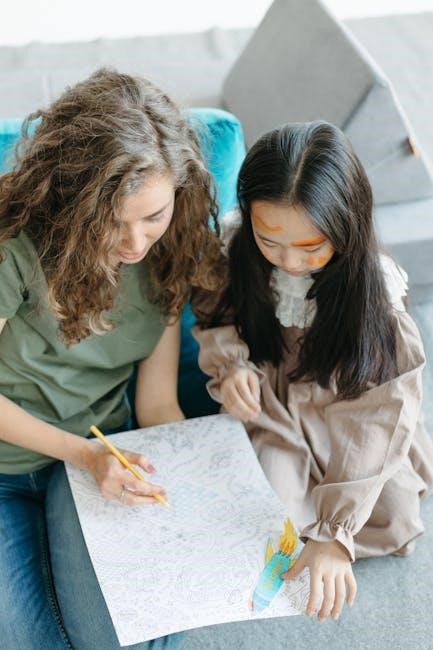Parent interviews are crucial for understanding a child’s profile, addressing concerns, and aligning educational goals. They foster partnership between parents and educators, ensuring a child’s holistic development.
1.1 Importance of Parent Involvement in Interviews
Parent involvement in interviews is vital for fostering collaboration between families and educators. It ensures a child’s needs, values, and goals are understood, creating a supportive environment for their growth. Schools value parent insights to align educational strategies with home values, promoting consistency. Active participation demonstrates commitment to a child’s success, helping educators tailor approaches. Open communication builds trust, enabling shared decision-making. Parent involvement also highlights their role as partners in education, empowering them to advocate effectively. This collaboration fosters a holistic understanding of the child, leading to better academic and personal outcomes. Engaged parents contribute to a child’s long-term success.
1;2 Purpose of Parent Interviews
Parent interviews serve as a vital platform for schools and families to collaborate, ensuring a child’s educational journey aligns with their needs and aspirations. These meetings allow educators to gain insights into a child’s personality, strengths, and challenges, helping tailor learning strategies. They also provide an opportunity for parents to share their values and expectations, fostering a partnership between home and school. Interviews help schools assess how to support a child’s development while enabling parents to understand the educational environment. This exchange ensures a cohesive approach to a child’s growth, addressing academic, social, and emotional needs effectively. Regular communication strengthens trust and collaboration.

Preparing for the Interview
Research the school, review common questions, and gather necessary documents. Help your child prepare and practice active listening to ensure a productive and informed conversation.
2.1 Researching the School or Institution
Understanding the school’s mission, values, and policies is essential for a productive interview. Visit the school’s website to review their curriculum, extracurricular activities, and teaching methods. Researching the institution helps align your expectations with their offerings, ensuring a smoother discussion. Familiarize yourself with their admission criteria, teacher qualifications, and student support services. Reading reviews and testimonials from current or former parents can provide insights into the school’s culture. This preparation enables you to ask targeted questions, demonstrating your interest and commitment to your child’s education. It also helps identify if the school aligns with your child’s needs and your family’s values.
2.2 Understanding Common Interview Questions for Parents
Preparing for common interview questions is key to making a positive impression. Schools often ask parents about their child’s strengths, weaknesses, hobbies, and interests. They may also inquire about family values, educational philosophy, and involvement in the child’s learning. Questions about your child’s social readiness are common for younger children, while academic focus becomes more prominent in middle and high school. Understanding these questions helps you articulate your expectations and alignment with the school’s mission. Being honest and enthusiastic in your responses demonstrates your commitment to your child’s education. This preparation ensures a meaningful conversation, highlighting your role as a supportive partner in their educational journey.
2.3 Helping Your Child Prepare for Their Part of the Interview
Preparing your child for their part of the interview is essential to help them feel confident and articulate. Encourage them to talk about their strengths, interests, and goals. Role-play common questions, such as “What are your hobbies?” or “Why do you like school?” This helps them practice clear and thoughtful responses. Teach them to listen carefully and answer succinctly. Discuss the importance of honesty and positivity in their answers. Remind them to maintain good body language and eye contact. Most importantly, reassure them that it’s okay to ask for clarification if they’re unsure. This preparation not only helps your child shine but also fosters a sense of readiness and self-assurance.
2.4 Gathering Necessary Documents and Information
Gathering essential documents and information is vital for a smooth and productive interview. Start by organizing your child’s academic records, such as report cards, progress reports, and any special needs documents. Prepare a list of key points you want to discuss, like your child’s strengths, challenges, and interests. Bring any relevant medical or psychological evaluations if applicable. Consider creating a folder with all materials for easy access. Additionally, prepare a written summary of your child’s personality, hobbies, and goals to share during the conversation. Having everything ready ensures you can focus on meaningful dialogue during the interview.

Communication Strategies for Parents
Effective communication involves active listening, asking thoughtful questions, maintaining positive body language, and showing cultural awareness. These strategies help build rapport and ensure clear understanding during interviews.
3.1 Active Listening Skills
Active listening is essential during parent interviews. It involves fully focusing on the speaker, understanding their perspective, and responding thoughtfully. Parents should avoid interrupting and instead nod or use verbal cues like “I see” to show engagement. Paraphrasing what the interviewer says ensures clarity and demonstrates attentiveness. This technique also helps in addressing concerns effectively and building trust. By actively listening, parents can better understand their child’s needs and collaborate with educators to create a supportive environment. This approach fosters open communication and strengthens the partnership between parents and schools, ultimately benefiting the child’s educational journey.
3.2 Asking Effective Questions
Asking effective questions during parent interviews is vital for gaining insights into a child’s education. Parents should prepare open-ended questions that encourage detailed responses, such as “How does my child engage in class discussions?” or “What strategies can we use at home to support their learning?” Avoid leading questions and focus on understanding the child’s strengths, challenges, and social interactions. This approach helps parents and educators collaborate effectively, ensuring the child receives tailored support. By asking the right questions, parents can address concerns proactively and make informed decisions about their child’s educational path, fostering a positive and productive dialogue with the school.
3.3 Body Language and First Impressions
Body language and first impressions play a significant role in parent interviews. Maintaining eye contact, smiling, and using open gestures convey confidence and engagement. Dressing appropriately shows respect for the occasion. A positive demeanor, such as nodding and leaning forward, demonstrates attentiveness. Avoid crossing arms or appearing distracted, as these can signal disinterest. First impressions set the tone for productive communication, fostering trust and collaboration between parents and educators. By being mindful of non-verbal cues, parents can create a favorable atmosphere, ensuring the interview is both meaningful and effective for their child’s educational journey.
3.4 Cultural Considerations in Communication
Cultural considerations are vital in parent interviews to ensure effective communication. Respecting cultural differences fosters a welcoming environment, allowing parents to express their values and expectations freely. Understanding diverse communication styles, such as directness versus formality, helps bridge gaps. Being aware of cultural nuances, like body language and eye contact norms, prevents misunderstandings. Schools and educators should adopt inclusive practices, encouraging open dialogue while respecting cultural backgrounds. This approach ensures that all families feel valued, promoting collaboration and mutual understanding. By honoring cultural diversity, interviews become more meaningful and productive for everyone involved.

Types of Parent Interviews
Parent interviews vary, including parent-teacher meetings, school admissions, teen job interviews, and special needs discussions. Each type addresses specific needs and goals, ensuring tailored support for families;
4.1 Parent-Teacher Interviews
Parent-teacher interviews are essential for discussing a child’s academic progress, behavioral patterns, and social development. These meetings provide an opportunity for parents and educators to collaborate, ensuring a personalized approach to education. By sharing insights, both parties can address challenges early and celebrate achievements. Teachers often highlight strengths and areas needing improvement, while parents offer valuable context about their child’s home environment. This open dialogue fosters trust and cooperation, creating a supportive ecosystem for the child’s growth. Regular interviews help align expectations and strategies, ensuring everyone works toward the same goals. They are a cornerstone of effective communication in education.
4.2 School Admission Interviews
School admission interviews are a crucial step in the enrollment process, allowing schools to assess a child’s fit while giving parents insight into the institution’s values. These interviews often involve discussions about the child’s hobbies, strengths, and weaknesses, as well as family values and educational philosophy. Parents should prepare by researching the school’s mission and practicing responses to common questions. Demonstrating enthusiasm and honesty is key to making a positive impression. Additionally, parents should ask questions to gauge alignment with their expectations. This two-way conversation helps both parties determine if the school is the right fit for the child’s growth and development.
4.3 Job Interviews for Teens: Parental Guidance
Guiding teens through job interviews requires a balance of support and independence. Parents should help research the company, practice responses to common questions, and review appropriate attire. Encourage mock interviews to build confidence and refine communication skills. Assist with crafting a resume, highlighting relevant skills and experiences. Discuss the importance of punctuality, eye contact, and professionalism. While it’s crucial to offer guidance, allow teens to take ownership of the process to foster responsibility and self-reliance. This collaborative approach ensures they are well-prepared while gaining valuable life skills for future opportunities.
4.4 Special Needs Interviews
Special needs interviews require parents to advocate effectively for their child’s unique requirements. Prepare by gathering documents like IEPs or therapy reports. Be open about your child’s challenges and strengths, ensuring educators understand their needs. Discuss accommodations and support services your child requires. Collaborate with educators to create a tailored plan. Practice articulating your child’s needs clearly and confidently. Ask questions about available resources and how progress will be monitored; This interview is a crucial opportunity to ensure your child receives the support they need for success. Approach it with preparation and partnership to advocate effectively.

Handling Different Age Groups

Interview approaches vary by age. Younger children focus on social skills, while teens emphasize independence and academic goals. Tailor strategies to each stage for effective communication.
5.1 Interviews for Younger Children: Focus on Social Readiness
Interviews for younger children often focus on assessing social readiness and interpersonal skills. These sessions may involve observed play or interactive activities to gauge how well the child interacts with others. Parents can prepare by encouraging their child to express thoughts clearly and demonstrate good manners. Discussing the importance of sharing, cooperation, and respect helps build confidence. Highlighting their ability to listen and follow instructions is also key. By fostering these skills, parents can help their child make a positive impression and show readiness for a structured learning environment. This lays a strong foundation for their educational journey. Effective preparation ensures a smooth transition.
5.2 Middle and High School Interviews: Academic Focus
Interviews for middle and high school students often emphasize academic performance and future goals. Parents should help their child review academic records and practice discussing strengths, weaknesses, and interests. Encourage honesty about challenges and how they’ve been addressed. Discussing extracurricular activities and hobbies can highlight well-roundedness. Parents should also guide their child to articulate long-term educational and career aspirations. Understanding the school’s expectations and aligning them with the child’s goals is crucial. Preparing thoughtful questions about the curriculum and support systems demonstrates engagement. This academic focus helps schools assess readiness and potential, ensuring a tailored educational experience. Effective preparation fosters confidence and clarity, enabling students to present themselves effectively.
5.3 Teen Interviews: Balancing Independence and Guidance
Teen interviews require a balance between fostering independence and providing guidance. Parents should help their teen research the interviewer and practice responses to common questions about strengths, weaknesses, and career goals. Encourage honesty and confidence while discussing academic achievements and extracurricular activities. Guide your teen to articulate their interests clearly and ask thoughtful questions about opportunities and expectations. While allowing them to take the lead, offer support by reviewing possible scenarios and helping them present themselves authentically. This balance ensures teens feel prepared and empowered, while parents remain supportive without overshadowing their child’s voice. Effective preparation builds confidence and readiness for real-world interactions.

Common Interview Questions for Parents
Parents are often asked about their child’s hobbies, strengths, and challenges, as well as their education philosophy and involvement in their child’s learning journey.
6.1 Questions About Your Child’s Hobbies and Interests
Interviews often include questions about your child’s hobbies and interests to understand their personality, creativity, and passions. Be prepared to discuss specific activities they enjoy, how these hobbies contribute to their development, and how you support their interests. Schools may ask how these activities help build their social skills, creativity, or problem-solving abilities. Highlighting how you encourage their passions showcases your involvement in their growth. Be specific about how their hobbies reflect their character and strengths. This helps the interviewer understand your child’s unique qualities and how they can thrive in the school environment.
6.2 Questions About YourChild’s Strengths and Weaknesses
Be honest and balanced when discussing your child’s strengths and weaknesses. Highlight specific strengths, such as academic abilities or interpersonal skills, and provide examples. For weaknesses, focus on areas where your child is actively improving, showing self-awareness and growth. Avoid generic answers; instead, demonstrate how you support their development. Schools value this insight to tailor their approach. Framing weaknesses positively, like “they sometimes struggle with time management but are learning to prioritize tasks,” shows proactive parenting. This helps educators understand your child’s needs and how to support their progress effectively.
6.3 Questions About Family Values and Education Philosophy
Questions about family values and education philosophy help schools understand your expectations and alignment with their mission. Be honest about your values, such as respect, hard work, or creativity, and how they influence your child’s upbringing. Discuss your education philosophy, like the importance of critical thinking or character development. Highlight how you support learning at home, whether through conversations, activities, or resources. Schools seek to understand how your values and approach will complement their teaching methods. This alignment fosters a collaborative environment for your child’s growth. Be specific and genuine in your responses to help the school assess compatibility.
6.4 Questions About Your Involvement in Your Child’s Education
Questions about your involvement in your child’s education assess your commitment to their academic and personal growth. Be prepared to discuss how you support their learning, such as checking homework, attending school events, or communicating with teachers. Highlight specific ways you encourage curiosity and responsibility, like reading together or helping with projects. Schools value active involvement, so share examples of how you collaborate with educators and foster a love for learning at home. Emphasize your role in monitoring progress and addressing challenges, showing how you create a supportive environment. Demonstrating consistent engagement underscores your partnership in your child’s educational journey.

Special Considerations for Parents
Special considerations include handling career gaps, discussing special needs, and navigating co-parenting or single parenting. These topics require thoughtful preparation to address confidently and transparently.
7.1 Handling Career Gaps as a Parent
Addressing career gaps in interviews requires confidence and clarity. Emphasize the skills gained during your hiatus, such as multitasking, time management, and communication, which are vital for parenting. Highlight how these skills enhance your ability to contribute effectively. Prepare a concise explanation focused on personal growth and how it aligns with your role. Avoid apologies; instead, frame the gap as a strategic period for skill development. Showcase enthusiasm for re-entering the workforce or supporting your child’s education. This approach demonstrates resilience and readiness to excel in new challenges.
7.2 Discussing Your Child’s Special Needs

When discussing your child’s special needs in an interview, honesty and clarity are key. Be prepared to explain their requirements and how you support their development. Highlight any therapies, accommodations, or strategies that have proven effective. Bring relevant documents, such as Individualized Education Programs (IEPs), to provide context. Discuss how you collaborate with educators to ensure your child’s success. Ask questions about the institution’s support services and inclusivity measures. This demonstrates your proactive approach and helps ensure your child’s needs are met. Open communication fosters a supportive environment, benefiting both your child and the educational team.
7.3 Navigating Co-Parenting or Single Parenting Scenarios
Co-parenting or single parenting scenarios require open communication during interviews. Discuss how you collaborate with educators to ensure consistency in your child’s education. Highlight your proactive role in maintaining communication and supporting your child’s needs. Be honest about challenges but emphasize solutions and teamwork. For co-parenting, explain how both parents contribute to decision-making. For single parents, discuss any support systems in place. Address how you manage responsibilities and ensure your child’s well-being. This demonstrates your commitment to your child’s education and helps educators understand your family dynamics. Open dialogue fosters trust and collaboration, ensuring your child’s success.

Follow-Up After the Interview
Acknowledge the interview with a thank-you note, expressing gratitude and reiterating your commitment. Maintain open communication and discuss outcomes with your child to ensure alignment and understanding.
8.1 Writing a Thank-You Note
A thank-you note after a parent interview is a thoughtful way to express gratitude. It should be concise, mentioning key points discussed and appreciation for the opportunity. Personalize it by highlighting specific conversations or insights gained. This gesture not only reflects professionalism but also reinforces your commitment to your child’s education. Ensure the tone is sincere and positive, leaving a lasting impression. Sending it promptly after the interview is ideal, as it demonstrates enthusiasm and consideration. A well-crafted note can strengthen your relationship with the school and show genuine appreciation for their time and effort.
8.2 Maintaining Communication with the School
Maintaining communication with the school after the interview is vital for fostering a collaborative relationship. Regular updates about your child’s progress, achievements, and challenges ensure alignment with the school’s goals. Use digital platforms, emails, or parent-teacher portals to stay connected. Attend follow-up meetings and participate in school events to demonstrate commitment. Open dialogue helps address concerns promptly and builds trust. Consistent communication also provides reassurance to the school about your involvement in your child’s education. By staying proactive, you create a supportive environment that benefits your child’s academic and personal growth, ensuring they thrive in their educational journey.
8.3 Discussing the Interview Outcome with Your Child
Discussing the interview outcome with your child is essential for their growth and understanding. Be honest about the results, highlighting strengths and areas for improvement. Encourage open dialogue, allowing your child to express their feelings and thoughts. Frame the discussion positively, focusing on learning opportunities rather than disappointments. Provide guidance on how to improve for future interviews, such as practicing responses or developing new skills. Offer reassurance and support, reinforcing your belief in their abilities. This conversation helps your child gain confidence and prepares them for future challenges, fostering resilience and a growth mindset in their educational journey.
Parent interviews are vital for fostering partnerships and understanding a child’s needs. Effective preparation and communication ensure positive outcomes, supporting both the child and the institution.
9.1 Final Tips for Parents
Be genuine and open during interviews, focusing on your child’s strengths and challenges. Prepare thoughtful questions and maintain a positive attitude. Follow up with gratitude and keep communication consistent for long-term success.
9.2 The Long-Term Impact of Effective Interview Preparation
Effective preparation enhances communication, builds trust with educators, and ensures alignment with your child’s educational journey. It fosters a supportive environment, aiding your child’s academic and personal growth while establishing a lasting partnership with the school.
